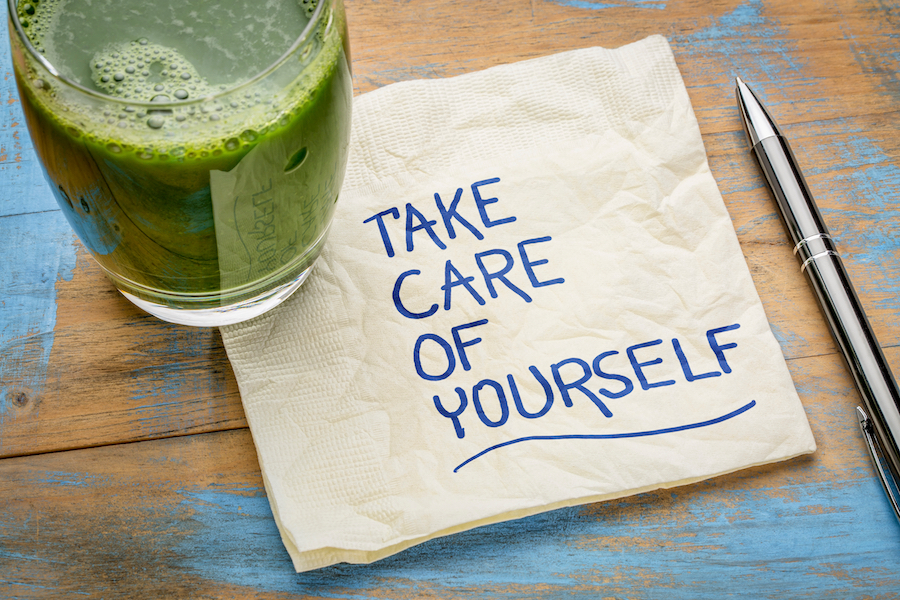10 ways to promote self-care to help employees strive

While work has long been cited as the most significant cause of stress for most people, with the arrival of COVID-19, stress levels have reached new heights.
A Korn Ferry study reveals that, in early May, 73% of American professionals were feeling burned-out and the top reasons cited were no separation between work and home and unmanageable workloads.
The line between work and life
Not only are many people experiencing fear and anxiety due to the uncertainty of the current situation, but with so many of us now working from home, the line between work life and private life has become blurrier.
The trigger that once prompted us to shut down our computers, head home, pick up the kids, or go to the gym after work is now gone. Without places to be or people to see, nothing is pulling us away from our computers; we can send another e-mail or five, get a head start on tomorrow’s meeting, or start a new project. There's always something else to do, always something on the to-do list.
However, with increased stress and increased demands, unless we prioritise our health and wellbeing, we run the risk of burning out.
It starts with you: making self-care a conscious choice
While a need for greater work-life balance has become into focus over the past decade or so, now, more than ever, self-care needs to be made a priority.
Most of us have no problem prioritising an extra work task for our manager or someone else even after having worked a long day, but the idea of prioritising ourselves and our health is not something many of us are accustomed to doing. The truth is, unless we make a conscious choice to look after our health and wellbeing, it won’t happen.
As an HR leader or manager, creating greater self-care and employee wellbeing starts with you. HR plays a crucial role in promoting company culture through its recruitment selections, onboarding, and offboarding processes routines, policies and practices, and employee benefits programmes.
Taking care of yourself and your employees
Below, we look at 10 simple ways HR leaders can practice self-care and encourage employees to do the same.
- Make self-care automatic: Self-care needs to become a habit and part of your everyday; just like brushing your teeth or showering, it needs to become automatic. Schedule self-care time, book it in your calendar. For example, take a lunch break for a full hour every day, including 30 minutes walking.
- Give thanks and give praise: With the busyness of everyday life going on, it’s easy to forget to thank and acknowledge the efforts of our colleagues. Take the time to praise effort, say thank you, and convey appreciation. Not only does it lift the spirits of the recipient but yours too.
- Eat well and drink lots of water: Make sure you eat a proper breakfast and lunch every day. Eat fresh foods that energise you.Small changes to your diet can have a huge effect on your energy and productivity. Keep hydrated by drinking at least three litres of water every day.
- Take breaks: Especially at a time when so many of us are working from home, it's easy to get stuck in front of the computer and neglect taking breaks. However, taking regular small breaks is important. Many find The Pomodoro Technique helpful; the technique encourages working for 25 minutes, then breaking for five minutes, with a 15-minute break at least once every two hours.
- Encourage employees to use their benefits: What employee benefits are you currently offering? Review your benefits to make sure they include benefits focus on wellbeing. For example, be it a gym pass, yoga, massage, grocery deliveries, or online therapy, offering your employees the benefits they want and need is a great way to support their wellbeing. How do you know what benefits your employees want? Read this article.
- Prioritise sleep: Adequate sleep is vital for various brain functions, including cognition, concentration, productivity, and performance. Sleep seven to nine hours every day and try to stick to roughly the same time you go to bed and wake. Read more about the importance of sleep here.
- Exercise: The body and mind are connected. Physical exercise not only provides physical benefits but mental ones too, increasing productivity, reducing stress, and improving our mood. As a general goal, aim for at least 30 minutes of moderate physical activity every day.
- Be kind to yourself: Some days, we are more focused than other days; some days, we perform better than other days. Sometimes we miss deadlines, sometimes we make mistakes. That's OK. We all have good and bad days. Cut yourself some slack and be kind to yourself.
- Write out a task list for each day: Some days, it seems like everything is urgent and important Start every day by looking at your to-do list and prioritise the items. Make sure your list is realistic. At the end of each day, write down your task list for the next day.
- Reflect upon and celebrate victories: For many of us, as soon as we complete one task or achieve a particular milestone, we're onto the next thing – no looking back. Instead, take time to reflect on what you've achieved, how far you've come, and celebrate the victory no matter how small it is. When you celebrate, endorphins are released inside your body, making you feel good.
With the long- and short-term future still in question regarding COVID-19 and how we live and work, it’s time to make self-care a priority today.
This article is provided by Benify.
Supplied by REBA Associate Member, Benify
Benify offers the market's leading global benefits and total reward platform.







